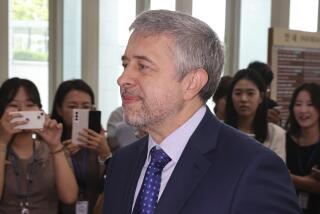WORLD REPORT EXTRA: The Coup and Beyond : World View : Holding Out for Hammer and Sickle : There are still several orthodox Communist states in the world. Their reaction to the sudden fall--and return--of Mikhail Gorbachev. : NORTH KOREA : Pyongyang’s Odd Drama
- Share via
TOKYO — While Mikhail Gorbachev’s ouster put the world in a state of shock, the event set off a strange little drama at Panmunjom, the truce village that straddles the border where the massive armies of North and South Korea face off in what many believe to be the most dangerous flash point in the world.
Representatives of North Korea discussing upcoming talks between the prime ministers of the two sides suddenly submitted an odd request to their southern counterparts. Seoul had just had an outbreak of cholera, the official explained, and Pyongyang could not permit delegates from such exposed areas into the city. North Korea wanted to delay the talks a few days and change the venue from Pyongyang, the North Korean capital, to Panmunjon.
The next evening things grew more serious. North Korean guards opened fire, hitting an observation post on the south side, the first such incident in a year and a half. South Korea scoffed at the request to delay the meeting, protested the machine-gun fire and put its armed forces on alert.
It all sounds dangerous, but the events were no more than another chapter in the never-ending gamesmanship as the two sides reacted to events in the Soviet Union.
North Korea, Western analysts believe, thought that with the fall of Gorbachev, the winds were shifting in its favor and wanted to delay talks until it could negotiate from a stronger position.
The north may have won a small battle. It now looks like the talks will be delayed. But with the failure of the Soviet coup, when the two premiers next meet, North Korea may find itself having been backed into an even weaker bargaining position.
The Soviet military, a key backer of North Korea and a critical player in the coup, is likely to emerge from the Soviet crisis less powerful. Gorbachev, on whom South Korea bet heavily with a $3-billion package in loan commitments, is back in power and needs Seoul’s economic help more than ever to reform his economy.
“In the past, when we asked the Soviets why they kept providing weapons to the north, they said they couldn’t control (their own) military,” said Rhee Sang Woo, professor of political science at Sogang University in Seoul and an adviser to the National Unification Board that handles South Korea’s negotiations with the north. Now, he believes, Gorbachev will be better positioned to follow through on his promises to put pressure on North Korea.
For North Korea, a further decline in Soviet support would be just another blow in what has been a long line of political and economic setbacks.
The Soviet Union has already insisted on conducting all trade with North Korea on a cash basis. As a result, trade has shrunk rapidly.
China has also insisted on moving from barter to trade based on cash. Unfortunately, North Korea has no cash. And a drought that has lasted several years is forcing the country to spend what it does have buying rice and grain.
North Korea’s economic problems and its political isolation have gradually forced it to become more yielding in its foreign policy. The country agreed to apply for a seat in the United Nations after it became clear China was unlikely to veto South Korea’s entry.
While Gorbachev has survived the coup, the incident shook South Korea, which had depended heavily on the Soviet Union to provide a growing market for Korean products and on Gorbachev to maintain pressure on North Korea.
“They had been so optimistic about the fate of Russia this coup came as a shock,” said Hajime Izumi, a Korean studies expert at Shizuoka University in Japan.
Gorbachev may now be more willing to go along with South Korea but he will have his own agenda. “The Russians will link their (pressure on North Korea) with economic cooperation,” said Kim Deok, a North Korea watcher at Hankuk University of Foreign Studies.
More to Read
Sign up for Essential California
The most important California stories and recommendations in your inbox every morning.
You may occasionally receive promotional content from the Los Angeles Times.













